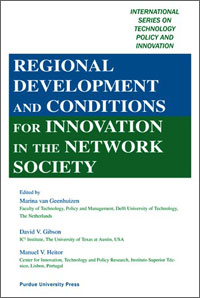 Scholars from different disciplines and perspectives increasingly recognize that modern regional economic growth critically depends on factors like active networking, favorable institutions, entrepreneurial spirit and a fast production and circulation of knowledge. Regional Development and Conditions for Innovation in the Network Society is organized in three main parts. Part I, titled “Emerging Concepts and Approaches,” has four chapters that focus on the key concepts of innovation and sustainability and on evolutionary thinking. In addition, an overall picture is given of approaches to innovation in a spatial context and to regional policymaking. Part II, titled “Telecom Infrastructures Strategies and Implications,” has five chapters with a focus on the adoption strategy of ICT by various governments and on implications of ICT use on housing and production. Part III, “Conditions for Networks, Entrepreneurship and Development of High-Tech Clusters,” contains seven chapters, each with a focus on requirements for high-technology based economic growth, such as technology competence, job features, the role of change agents, venture capital and specific networking.
Scholars from different disciplines and perspectives increasingly recognize that modern regional economic growth critically depends on factors like active networking, favorable institutions, entrepreneurial spirit and a fast production and circulation of knowledge. Regional Development and Conditions for Innovation in the Network Society is organized in three main parts. Part I, titled “Emerging Concepts and Approaches,” has four chapters that focus on the key concepts of innovation and sustainability and on evolutionary thinking. In addition, an overall picture is given of approaches to innovation in a spatial context and to regional policymaking. Part II, titled “Telecom Infrastructures Strategies and Implications,” has five chapters with a focus on the adoption strategy of ICT by various governments and on implications of ICT use on housing and production. Part III, “Conditions for Networks, Entrepreneurship and Development of High-Tech Clusters,” contains seven chapters, each with a focus on requirements for high-technology based economic growth, such as technology competence, job features, the role of change agents, venture capital and specific networking.
This book grew out of the International Conference on Technology Policy and Innovation held in The Hague in June 2001.

